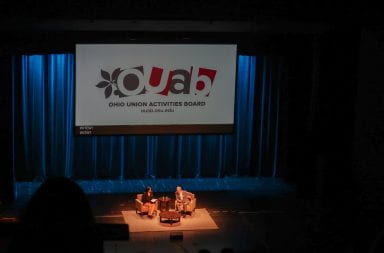Wednesday evening, the Ohio Union Activities Board presented Ohio State students the opportunity to listen to Edward Snowden speak about his life story and the importance of privacy via a live stream video chat from Moscow.
“(We) found out that Edward Snowden was doing events via satellite at other universities and the reception was positive,” said Zack Miglich, a fifth-year in mechanical engineering and director of lectures for OUAB. “(Our) committee felt it would be a very unique, relevant, diverse and thought-provoking event.”
Snowden, a former CIA employee and contractor for the National Security Agency, is infamously known for exposing NSA surveillance tactics via three journalists in 2013 without the government’s authorization. As a result of these actions, he faces three felony charges in the United States.
He currently has asylum status in Russia, as he would face a trial without a jury under the Espionage Act upon his return to America.
Snowden noted that President-elect Donald Trump and Trump’s pick for CIA director Mike Pompeo have both called for his execution.
“My green card is up for renewal next year,” Snowden said. “We’ll see what happens.”
Snowden shared about his family, military and government background with the sold-out auditorium.
“I always expected to work for the federal government, as both of my parents work in government jobs,” Snowden said. “I recognize that this is an irony.”
Snowden explained his reasoning behind his decision to provide journalists with information on government surveillance tactics, and it essentially boiled down to serving the public and protecting their interests over government interests.
“I had not just the right to do this, I had the responsibility,” Snowden said. “Democracy only works for all of us when we all work to uphold the system. The letters of the constitution are not going to jump off the page and protect your rights. People give those letters strength.”
Snowden said when he worked for the CIA, he did not swear an oath to secrecy, but he swore an oath of service to uphold the constitution.
“It was clear to me that, in that moment, that the constitution was being violated, members of government knew it was being violated, and the courts were being refused the standing to actually determine this case,” Snowden said. “Congress was afraid of being criticized for leaking classified information so they would say nothing about this, while President Obama was actively expanding these surveillance programs.”
Parts of Snowden’s presentation included photographs of newspaper headlines, blurbs from news articles and video clips that painted a picture of government corruption and unwarranted violations of privacy into the lives of American citizens.
“This is the problem today: surveillance technology has outpaced government controls,” Snowden said. “This is not science fiction, this is happening now.”
Snowden discussed his heavily weighted decision in going to the media about the discrepancies between the actions the federal government was performing and what they were actually telling American citizens they were doing.
“I asked my colleagues, ‘what do you think about this? Is this right? Does this seem legal and consistent to you?’ and they said ‘no, but you know what happens to people who speak up,’” Snowden said.
Snowden made several references to whistleblowers before him and the repercussions that their decisions made on society.
He specifically noted the case of Daniel Ellsberg releasing the Pentagon Papers to the New York Times in 1971 during the Vietnam War.
“Ellsberg told me, after 40 years of thinking about it, that his advice was don’t wait,” Snowden said. “Don’t do what he did, where he spent eight years in an office, watching the war grow, because he could have saved a war’s worth of lives by shortening the war.”
A Q&A session concluded the presentation. Audience members asked Snowden questions via Twitter using the hashtag #SnowdenUncovered. When asked what students can do to protect their personal privacy, Snowden responded by saying that preemptive measures are limited, and that “this is not a battle you are going to win”. He shared his final thoughts with the crowd by emphasizing the importance of privacy.
“People who say ‘I have nothing to hide so I have nothing to fear’ are missing the point,” Snowden said. “Privacy isn’t about having something to hide, it’s about having something to protect.”
Snowden’s lecture ended with a lengthy applause. Despite this, not all of the responses were positive, due to the controversial nature of Snowden’s whistleblower status.
“We had a lot of really positive feedback, but there were also a number of negative responses, which we expected,” Miglich said. “The purpose of OUAB providing a thought-provoking event like this isn’t to take sides or push a stance. We really are aiming to promote a chance to learn and spark discussion on a very relevant topic in our society today, regardless of which side of the topic you stand.”


